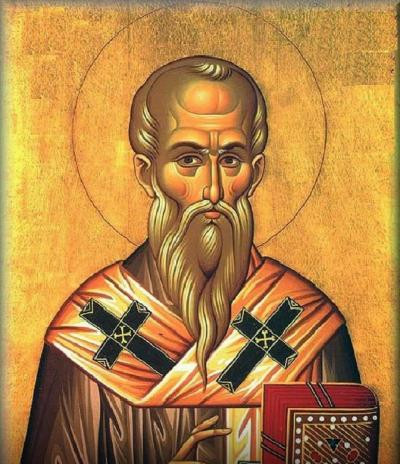
Saint of the Day for 13 October: St Theophilus of Antioch
St Theophilus of Antioch: the bishop who defended the Christian faith
Name
St Theophilus of Antioch
Title
Bishop
Birth
2nd century, Unknown
Death
2nd century, Antioch of Syria
Recurrence
13 October
Martyrology
2004 edition
Prayer
You alone are holy, Lord, and outside of you there is no light of goodness: through the intercession and example of Bishop St Theophilus, grant that we may live an authentically Christian life, lest we be deprived of your vision in heaven. Amen
Roman Martyrology
Commemoration of Saint Theophilus, bishop of Antioch, a man of great learning, who held, sixth after the blessed Apostle Peter, the pontificate of this Church and wrote a work against Marcion to defend the righteous faith.
The Saint and Mission
Saint Theophilus of Antioch, one of the first Christian apologists, stands out as an exemplary witness of the evangelical mission in the intellectual and cultural context of his time. In the metropolis of Antioch, a crossroads of cultures, languages and religions, Theophilus worked in an environment where Christianity was often misunderstood or even persecuted. His most famous work, ‘Ad Autolycum’, is a clear demonstration of this. Through this text, Theophilus not only defended the Christian faith against the accusations of the pagans, but also tried to present Christianity as a rational and superior doctrine to polytheistic traditions. His approach was never aggressive or derisive, but aimed at an open, constructive and respectful dialogue with those who did not share his faith. This makes him a model of evangelisation that prioritises peaceful persuasion and argumentation over coercion or confrontation. St Theophilus shows that mission is not only about proclaiming the Good News, but also about entering into dialogue with the cultures and traditions in which it is embedded. His ability to connect Scripture with the philosophical ideas of his time shows a deep understanding of the importance of speaking the language of his interlocutor, finding common ground and building bridges rather than erecting barriers. Theophilus’ mission was to make Christ accessible to an erudite and sceptical audience, showing how the Christian faith could answer the existential questions and spiritual needs of humanity in a more complete and satisfying way than pagan traditions. This required not only a solid understanding of the faith, but also a deep familiarity with the cultural and intellectual currents of his time. The work and life of St Theophilus of Antioch remind us that the mission of the Church is not limited to geographical frontiers, but also extends to intellectual and cultural frontiers. Every context, every culture, every age presents unique challenges and opportunities for evangelisation. And, as Theophilus teaches us, meeting these challenges requires not only a heart burning with missionary zeal, but also an open mind, ready to listen, learn and dialogue. St Theophilus of Antioch offers us a vision of mission as dialogue. His example invites us to enter into conversation with the world around us, armed with the truth of the Gospel, but always with humility, respect and a genuine desire to understand and be understood.
The Saint and Mercy
St Theophilus of Antioch presents us with a picture of deep reflection on the nature of divine mercy. Although he is best known as one of the early Christian apologists, who passionately defended the faith against the criticisms and misunderstandings of his time, it is possible to glimpse in his works a subtle understanding of mercy as a fundamental aspect of God’s character and Christian living. In his work ‘Ad Autolycum’, St Theophilus engages in a dialogue with a pagan friend, attempting to explain and defend the Christian faith. Although it is an apologetic work, his effort to show the Christian God not only as a transcendent and powerful entity, but also as a God of deep compassion and mercy clearly emerges. In his words, we can perceive a vision of God who, while being the all-powerful Creator, cares deeply for his creation, showing love and mercy especially towards those who are lost or far from him. St Theophilus emphasises that while pagan deities were often seen as distant, vengeful or indifferent to the fate of humanity, the Christian God revealed Himself in human history through acts of mercy and salvation. This revelation culminates in the person and work of Jesus Christ, through whom divine mercy is fully and definitively manifested. Although St Theophilos did not devote specific treatises to the subject of mercy, his vision of God as a loving father, ready to forgive and welcome, reflects the heart of Christian doctrine. Mercy, in this context, is not just an attribute of God, but becomes an imperative for the believer. As God shows mercy, so too are Christians called to embody and reflect this mercy in their daily living. St Theophilus’ dialogue with Autolycum is in itself an act of mercy. Instead of condemning or rejecting people with different views, Theophilus chooses the path of loving and patient dialogue, seeking points of contact and offering clarification where doubts or misunderstandings arise. This attitude reminds us that mercy is not limited to acts of physical benevolence or words of consolation, but also manifests itself in respect, listening and sincere understanding of the other. St Theophilus of Antioch, though an apologist for the faith, offers us a shining example of how mercy can permeate every aspect of Christian life, from theology to praxis, from interreligious dialogue to pastoral action. His legacy invites us to rediscover and fully live God’s mercy, not only as recipients, but also as agents of that love in the world.
Hagiography
Theophilus ruled the church of Antioch in the 2nd century as the sixth bishop after the apostle St Peter, who was the first pastor of that Christian community. Theophilus was a man of great and also secular culture and was one of the church fathers and author of numerous apologetic works in defence of the Christian faith. He was born in Mesopotamia in paganism and…
